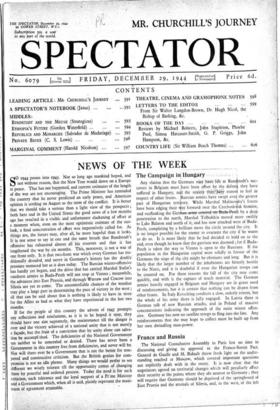The Campaign in Hungary . • .
Any elation that the Germans may.htie felt at Runcistedes suc- cesses in Belgium must ;have been offset by the defeats they have suffered in Hungary, anti the anxieti7 th(ti014fr reason to feel in respect of other fronts. Russian armies have swept over the greater part of Hungarian territory. While Marshal Malinoviky's forces have been edging their 4ay forward over the Czechosloiak frontier,
and outflanking the Ger -eentrecl-tyrrBuelet-Pesth by a deep penetration to the north, Marshal Tolbukhin moved more swiftly to Lake Balaton and north of it, and has now attacked west of Buda- Pesth, completing by a brilliant move the circle around the city. It is no longer possible for the enemy to evacuate the city if he wants to do so. It is more likely that he had decided to hold on to the end, even though he knew that the garrison was doomed ; for if Buda- Pesth is taken the way to Vienna is open to the Russians. If the population in the Hungarian capital were solidly in favour of the Germans the siege of the citi, might be obstinate and long. But it is likely that the larger number of the inhabitants are bitterly hostile to the Nazis, and it is doubtful if even the Hungarian troops can be counted on. For these reasons the fall of the city may come quickly, and with it the capture of much material. The German armies heavily engaged in Belgium and Hungary are in grave need of reinforcements, but it is certain that nothing can be drawn from Other fronts. In Italy Kesselring conducts a slow, orderly retreat, but the whole of his army there is fully engaged. In Latvia there is German talk of new Russian attacks, and in Poland of massive concentrations indicating the approach of the main winter offen- sive. Germany has now no satellite troops to fling into the line. Any reinforcements that she may hope to collect must be built up from her own dwindling man-power.


























